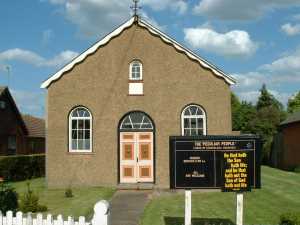Peculiar Peoples Church

The Peculiar Peoples Chapel at Tillingham stands as a reminder of a religious phenomenon which swept rural Essex in the 1850's.
Origin of the movement
The founder of the Peculiar People was a farm workers son called James Banyard who was born at Rochford in 1800.
He was prone to drunken behaviour until at the request of his wife he attended a service in the local Wesleyan Methodist chapel.
The words of the preacher had such an effect that James become teetotal and regularly attended church. He quickly became a reputable preacher on the Wesleyan circuit.
In 1837 he and Mr William Bridges were able to take over the lease to an old workhouse at Rochford which became the first Chapel of the new order which they named Peculiar People, taken from a line in the book of Deuteronomy.
The Spread
In the mid 1850's much of Essex was agricultural land occupied by naturally conservative people.
Activity by evangelists such as John Wesley had provided an appetite for non conformists religions.
The peculiar people preached a puritanical form of evangelism which proved so popular that chapels sprang up throughout rural Essex.
Over the next 100 years the attendance at chapels waned to the extent that many chapels closed or merged with other non conformist churches until 1956 when the peculiar People merged with other evangelical groups to become the Union of Evangelical churches.
The movement still continues with regular worship at the 19 chapels that remain throughout Essex.
Click Here to visit the web site of Union of Evangelical churches
Tillingham Chapel
The Peculiar people established followers in the Dengie and then built their chapel at Tillingham in 1867.
The building is a timber framed single storey rendered building on the main road to the south of the village.
The chapel attracted many local people who lived on the marshes or worked the fertile agricultural land.
A split saw the establishment of a second Chapel in the village that was called the Original Peculiar Peoples Chapel.
The chapel was built by local man Mr B Rodda in South Street opened on Sunday 30 October 1892.
This group were also called Tansleyites after their leader.
The rift was healed in 1913 at which point the second church was closed.

The Congregation
In keeping with the strictness of their religion Peculiars were expected to lead exemplary lives.
Dress for both sexes usually black with very plain straight laced fashions.
The Peculiars were expected to attend church each Sunday whatever the weather, their personal circumstances or state of health.
Service started in the morning with an adjournment at lunchtime to allow the congregation to eat lunch which they normally brought with them.
The service then resumed in the afternoon and there was a further evening service for those in the congregation who lived near to the Chapel.
Prayer dominated the services and the somber nature of their religion was indicated by the fact that hymns were sung unaccompanied by music
Medical Treatment
While some beliefs such as teetotal behaviour caused no conflicts the Congregation came into conflict with some local residents due to some fundamental beliefs.
They believed in divine healing and as a consequence would not accept any medical treatment or allow treatment for their children.
The normal treatment was for pastors or local chapel leaders to gather around the bed of a sick person , lay hands and then pray.
At a time when cholera was sweeping the county this resulted in the deaths of many children to the consternation of the majority of residents.
Despite criticism in the courts and other quarters the Peculiar People stuck to their beliefs during which period many children died.
Click here to visit a page on this site with more details and four cases of medical refusal
Controversy
Recently controversy about the Peculiar People has resurfaced following interviews about his childhood given by the well known author Bernard Cornwell famous for creating the soldier hero Richard Sharpe.
Bernard Cornwell was born in 1944 following a wartime affair between his mother and a Canadian Airman.
As often happened at the time after birth he was taken to an orphanage where he was one of five children adopted by an Essex couple called Wiggins who were both members of the Peculiar People.
Cornwell was brought up under a strict religion where the only book allowed was the bible.
He hated the restrictions on life and cites this experience as the reason for a continuing fascination for books.
He was fortunate to be sent to boarding school where his interests broadened and he never returned to the Peculiar family. His view is balanced by his sister who has replied to his comments by publishing her memories of a happy caring childhood.
His memory of the Essex marshes remained and he cites Sharpe's Regiment which was set in Essex Coastal marshes of the Rivers Crouch and Roach as one of his favourite novels.



